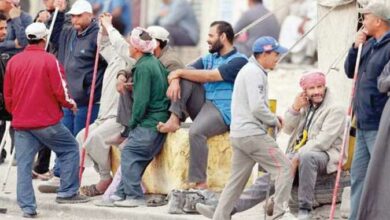The long-running industrial labor action by workers at Mansoura-Espana Garments Company took a tragic twist on Tuesday when a worker was run over and killed during a protest over unpaid wages.
On Tuesday, around 100 workers congregated outside the United Bank, which owns the company, demanding that they be paid their May salaries. Ahmed, a company worker who requested his real name not be used, said that a United Bank employee told them, “Nobody will do anything for you. Go and block the road outside."
Workers then moved to block the road, as suggested, among them Mariam Abdel Ghaffar, a mother of three and an employee with the company for over 20 years.
“A bus and a truck carrying bricks arrived at the scene," said Ahmed. "The bus refused to move but the truck ploughed into Mariam and two other women."
Abdel Ghaffar later died of her injuries.
“Another woman, Samah Abdel Aziz was dragged along for around 300 metres until protestors were able to make the driver stop. She’s currently in a critical condition in intensive care after undergoing a five-hour operation,” he continued.
Abdel Ghaffar was among the group of Mansoura-Espana employees who had refused a redundancy package offered last month, and which Ahmed says was negotiated between a Manpower Ministry official and the company in the absence of worker representation.
Under the deal, workers were offered wages totaling two-and-a-half months for each year of service. The offer expired within two weeks of being made, and under its terms, workers who rejected it are prohibited from demanding end-of-service compensation at a later date.
Among the group of workers who rejected the deal were six union activists who discovered that the sum offered to them did not include payment for the three-year period following their unlawful dismissal in 2008.
Mohsen al-Shaer, one of these six men, was dismissed for his involvement in strikes and protests workers have staged since the company was partly sold-off in 2002.
“Nothing has changed since the revolution. It’s the same system. Nothing has changed,” Shaer said, adding that 100 or so workers who refused the May deal did so because “they are too old to find work elsewhere.”
Workers allege that mismanagement and corruption have sent the once profitable company into a quagmire of debt. Ahmed described to Al-Masry Al-Youm complex loan transactions and interest rate re-evaluations that he says have resulted in the loss of at least LE1 million. A vastly underpriced sale of 11 feddans of the company’s land to the Delta Academy Company resulted in the disappearance of even more millions, he alleged.
The Mansoura-Espana story typifies the fate of many of Egypt’s factories sold-off when privatization began in the 1980s. Redundancies, deliberate mismanagement and failure to pay workers their financial entitlements were used in an attempt to force workers out, close the factory and sell the (often profitable) land on which it stood.
As details emerge concerning the extent of corruption in Mubarak’s regime, demands for re-nationalization increases. Ahmed, however, thinks that this is not the correct solution for Mansoura-Espana.
He suggests that, as a starting point, the Delta Academy Company pay the difference between the price they paid for the company’s land and its true value.
“We don’t know whether they actually intend to sell off the company – at the moment this is just a rumor. But they would be crazy to do so. The ready-made garment industry provides jobs for thousands: anyone can open a small workshop, workers don’t need qualifications and it’s easy to teach them the trade, so why close an equipped factory with experienced workers?” Ahmed said.
As for Mariam Abdel Ghaffar, Ahmed stressed one point.
“We insist that Mariam be considered a martyr of the revolution. She died for LE300, fighting the corruption of the former regime.”




